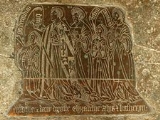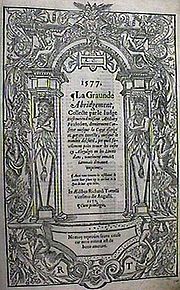
Anthony Fitzherbert
Encyclopedia
Sir Anthony Fitzherbert was an English
judge, scholar and legal author, particularly known for his treatise on English law
, New Natura Brevium (1534).
of Norbury
, Derbyshire
, and Elizabeth Marshall. His brothers died young so he succeeded his father as Lord of the manor of Norbury, an estate granted to the family in 1125. Wood states that he was educated at Oxford, but no evidence of this exists; nor is it known at which of the inns of court he received his legal training, though he is included in a list of Gray's Inn
readers He was called to the degree of serjeant-at-law
, 18 November 1510, and six years later he was appointed king's serjeant
.
He had already published (in 1514) his great digest of the Year Books
which was the first systematic attempt to provide a summary of English law. It was known as La Graunde Abridgement and has often been reprinted, both entire and in epitomes, besides forming the foundation of all subsequent abridgments. He also brought out an edition of "Magna charta cum diversis aliis statutis" (1519). In 1522 he was made a judge of common pleas and was knight
ed; but his new honours did not check his literary activity and in the following year (1523) he published three works: one on law, Diversité de courtz et leur jurisdictions (tr. by Hughes in 1646); one on agriculture, The Boke of Husbandire; and one of law and agriculture combined, The Boke of Surveyinge and Improvements. All three were frequently reprinted and though Sir Anthony's authorship of the Boke of Husbandrie was formerly questioned it is now regarded as established. Meanwhile his integrity and ability caused much business to be entrusted to him.
 In 1524 Fitzherbert was sent on a royal commission to Ireland
In 1524 Fitzherbert was sent on a royal commission to Ireland
; Archbishop Warham
appointed him by will sole arbitrator in the administration of his estate; and in 1529 when Wolsey fell, he was made a commissioner to hear chancery causes in place of the chancellor, and he subsequently signed the articles of impeachment against him. As one of the judges he unwillingly took part in the trials of the martyrs Fisher, More, and Haile, but he strongly disapproved of the king's ecclesiastical policy, particularly the suppression of the monasteries and he bound his children under oath never to accept or purchase any abbey lands. In 1534 he brought out "that exact work, exquisitely penned", La Novelle Natura Brevium
, which remained one of the classical English law books until the end of the eighteenth century. His last works were the constantly reprinted L'Office et Auctoryté des justices de peas (1538), the first complete treatise on the subject, and L'Office de Viconts Bailiffes, Escheators, Constables, Coroners. Sir Anthony was twice married, first to Dorothy Willoughby who died without issue, and secondly to Matilda Cotton by whom he had a large family. His descendants have remained Catholic and still own his estate of Norbury as well as the family seat at Swynnerton.
England
England is a country that is part of the United Kingdom. It shares land borders with Scotland to the north and Wales to the west; the Irish Sea is to the north west, the Celtic Sea to the south west, with the North Sea to the east and the English Channel to the south separating it from continental...
judge, scholar and legal author, particularly known for his treatise on English law
English law
English law is the legal system of England and Wales, and is the basis of common law legal systems used in most Commonwealth countries and the United States except Louisiana...
, New Natura Brevium (1534).
Biography
He was the sixth son of Ralph FitzherbertRalph Fitzherbert
Ralph Fitzherbert was Lord of the manor of Norbury, Derbyshire. His effigy in his suit of armour at Norbury church are reproduced in the Victoria and Albert Museum, in contemporary armour. -Biography:...
of Norbury
Norbury, Derbyshire
Norbury is a village in Derbyshire, England. It is located north of Rocester, on the B5033 road and the River Dove . The hamlet has links with George Eliot's family, the Evans...
, Derbyshire
Derbyshire
Derbyshire is a county in the East Midlands of England. A substantial portion of the Peak District National Park lies within Derbyshire. The northern part of Derbyshire overlaps with the Pennines, a famous chain of hills and mountains. The county contains within its boundary of approx...
, and Elizabeth Marshall. His brothers died young so he succeeded his father as Lord of the manor of Norbury, an estate granted to the family in 1125. Wood states that he was educated at Oxford, but no evidence of this exists; nor is it known at which of the inns of court he received his legal training, though he is included in a list of Gray's Inn
Gray's Inn
The Honourable Society of Gray's Inn, commonly known as Gray's Inn, is one of the four Inns of Court in London. To be called to the Bar and practise as a barrister in England and Wales, an individual must belong to one of these Inns...
readers He was called to the degree of serjeant-at-law
Serjeant-at-law
The Serjeants-at-Law was an order of barristers at the English bar. The position of Serjeant-at-Law , or Sergeant-Counter, was centuries old; there are writs dating to 1300 which identify them as descended from figures in France prior to the Norman Conquest...
, 18 November 1510, and six years later he was appointed king's serjeant
Serjeant-at-law
The Serjeants-at-Law was an order of barristers at the English bar. The position of Serjeant-at-Law , or Sergeant-Counter, was centuries old; there are writs dating to 1300 which identify them as descended from figures in France prior to the Norman Conquest...
.
He had already published (in 1514) his great digest of the Year Books
Year Books
The Year Books are the modern English name that is now typically given to the earliest law reports of England. Substantial numbers of manuscripts circulated during the later medieval period containing reports of pleas heard before the Common Bench. In the sixteenth century versions of this...
which was the first systematic attempt to provide a summary of English law. It was known as La Graunde Abridgement and has often been reprinted, both entire and in epitomes, besides forming the foundation of all subsequent abridgments. He also brought out an edition of "Magna charta cum diversis aliis statutis" (1519). In 1522 he was made a judge of common pleas and was knight
Knight
A knight was a member of a class of lower nobility in the High Middle Ages.By the Late Middle Ages, the rank had become associated with the ideals of chivalry, a code of conduct for the perfect courtly Christian warrior....
ed; but his new honours did not check his literary activity and in the following year (1523) he published three works: one on law, Diversité de courtz et leur jurisdictions (tr. by Hughes in 1646); one on agriculture, The Boke of Husbandire; and one of law and agriculture combined, The Boke of Surveyinge and Improvements. All three were frequently reprinted and though Sir Anthony's authorship of the Boke of Husbandrie was formerly questioned it is now regarded as established. Meanwhile his integrity and ability caused much business to be entrusted to him.

Ireland
Ireland is an island to the northwest of continental Europe. It is the third-largest island in Europe and the twentieth-largest island on Earth...
; Archbishop Warham
William Warham
William Warham , Archbishop of Canterbury, belonged to a Hampshire family, and was educated at Winchester and New College, Oxford, afterwards practising and teaching law both in London and Oxford....
appointed him by will sole arbitrator in the administration of his estate; and in 1529 when Wolsey fell, he was made a commissioner to hear chancery causes in place of the chancellor, and he subsequently signed the articles of impeachment against him. As one of the judges he unwillingly took part in the trials of the martyrs Fisher, More, and Haile, but he strongly disapproved of the king's ecclesiastical policy, particularly the suppression of the monasteries and he bound his children under oath never to accept or purchase any abbey lands. In 1534 he brought out "that exact work, exquisitely penned", La Novelle Natura Brevium
La Novelle Natura Brevium
La Novelle Natura Brevium was a treatise on English law by Anthony Fitzherbert. It is often cited in judgments today across the common law world, and represents an important tract on the rules of common law in the 16th century....
, which remained one of the classical English law books until the end of the eighteenth century. His last works were the constantly reprinted L'Office et Auctoryté des justices de peas (1538), the first complete treatise on the subject, and L'Office de Viconts Bailiffes, Escheators, Constables, Coroners. Sir Anthony was twice married, first to Dorothy Willoughby who died without issue, and secondly to Matilda Cotton by whom he had a large family. His descendants have remained Catholic and still own his estate of Norbury as well as the family seat at Swynnerton.
Cases and works
- It was held by Fitzherbert J, as early as 1536 (YB 27 Hy VIII Mich pl 10) that a member of the public could sue for a common or public nuisance if he could show that he had suffered particular damage over and above the ordinary damage suffered by the public at large. To the present day, causing a public nuisance has been treated as both a crime and a tort, the ingredients of each being the same.
- Attributed in Year Book 26 Hen 8 TT, p 4 c 15 (ed 1679) to Fitzherbert J: "for one can create common appurtenant at this day, and one can alienate it, and sever it from the land to which it is appurtenant ..." The author comments, at p 273, that "the passage ... must be understood as applying only to common appurtenant for a certain number".
- Fitzherbert, in his new Natura Brevium (1534) 94D, says that:"If a smith prick my horse with a nail, I shall have my action on the case against him, without any warranty by the smith to do it well"; and he supports it with an excellent reason: "for it is the duty of every artificer to exercise his art rightly and truly as he ought".
- In the note to Fitzherbert Nat. Brevium, 128, which is attributed to Lord Hale, it is said, “If A. and B. have lands adjoining, where there is no enclosure, the one shall have trespass against the other on an escape of their beasts respectively, Dyer 372, Rastal Ent. 621, 20 Ed. 4. 10, although wild dogs, &c., drive the cattle of the one into the lands of the other.” No case is known to us on which in replevin it has ever been attempted to plead in bar to an avowry for distress damage feasant, that the cattle had escaped without any negligence on the part of the plaintiff, and surely if that could have been a good plea in bar, the facts must often have been such as would have supported it.

